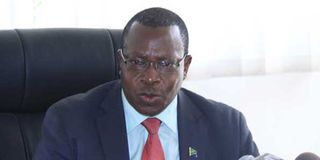Growth ‘to fall’ but still fastest in region

Minister of Finance and Planning, Dr Philip Mpango
What you need to know:
However, the country is still expected to be the fastest growing economy in East Africa and among the fastest in Africa.
Dar es Salaam. Tanzania may not experience annual economic growth of seven per cent and above in the next three years from 2017, the World Bank says in its latest Global Economic Prospects report. However, the country is still expected to be the fastest growing economy in East Africa and among the fastest in Africa.
The country has over the last 15 years enjoyed economic growth of more than seven per cent annually, but the World Bank estimates that the economy expanded by 6.6 per cent in 2017, which is 0.6 per cent lower than projections made in June, last year.
Growth in 2016 was seven per cent, and key drivers were the services, industry, construction and information and communications sectors.
The economy is projected to grow by 6.8 per cent this year and by 6.9 per cent in 2019 and 2020. This year’s projection means that Tanzania will remain the fastest growing economy in the East African Community bloc, followed by Rwanda and Kenya, which will grow by 5.9 and 5.5 per cent, respectively.
Contacted on Wednesday, the Minister of Finance and Planning, Dr Philip Mpango, said he was not in a position to comment immediately.
However, a lecturer on entrepreneurship and management at the University of Dar es Salaam, Dr Omari Mbura, said the World Bank’s projections dwelt on “worst-case” scenario assumptions, thus resulting in slowed growth projections.
He added that based on positive assumptions, Tanzania’s economy was on the right track, and might even grow at a higher rate than what the World Bank had projected.
Ongoing investments in mega-infrastructure projects, changing of the nation’s working culture and improved education investments will together help to stimulate economic growth.
“I believe that the World Bank report is somewhat conservative. But, I think that there have been so many changes which I have no doubt will impact future economic growth,” Dr Mbura said.
However, the slowdown in the Chinese economy, as well as lower commodity prices, rising debts and policy uncertainties were mentioned as the main challenges to future economic growth, including Tanzania’s.
GDP growth for China, a major trade partner for Tanzania, is projected to slow down to 6.4 per cent thus year and 6.3 per cent in 2019 and2020.
Despite Tanzania’s economic output having dipped in 2017, it still recorded the fifth fastest growth in Africa behind Ethiopia, Guinea, Senegal and Cote d’Ivoire. Tanzania is expected to retain that position this year behind Ghana (8.3 per cent), Ethiopia (8.2 per cent), Cote d’Ivoire (7.2 per cent) and Senegal (6.9 per cent).
University of Dar es Salaam economics professor Humphrey Moshi said Tanzania’s 6.8 per cent growth in 2018 as projected by the World Bank was a result of recent investment in infrastructure, coupled with an improved investment climate.
He also said Tanzania could grow by at least seven per cent if the country reduced its dependency on rain-fed agriculture and shifted to irrigation farming.
“If the government invests in irrigation farming, we would benefit a lot in terms of getting enough food as well as raw materials for industries that it envisions, including reducing poverty,” said Prof Moshi, who is also the director of the Centre for Chinese Studies.
Prof Moshi, who once served as an economic advisor to the Zanzibar government, further said that the government’s initiative to reduce recurrent expenditure in its budget and redirect it to development was another plus for future economic growth.
The director of strategic research at Research for Development (Repoa), Dr Abel Kinyondo, said the country’s projected economic growth of 6.8 per cent this year was “insufficient but encouraging.”
He added that growth was not inclusive because the majority of Tanzanians were in economic sectors that were not growing.
The National Accounts published by the National Bureau of Statistics (NBS) show that the services sector is continuing to dominate the largest share of the economy at current prices – 39.1 per cent in 2016.
Agriculture, fishing and livestock are also major contributors to the economy with 29 per cent share. Industry and Construction together contribute 25.2 per cent.




